Newsletter


Our Newsletter
Connections
Mar
23

Spiritual Renewal in the Digital Age
A sprig of parsley. An egg. It must be Spring. The world around is blooming, summer fruits are around the corner, and the world is modeling for us, indeed, begging us to begin anew. What does that mean for a spiritually minded person? It means pressing the reset button on how we interact with ourselves and each other.
Let’s begin with the self. Do you breathe? I have always appreciated the cliché of “stopping to smell the roses” because of its attention to nature, and because to smell something one needs to inhale deliberately and with intention. Do you sing? I have led singing for decades and something transformative happens to our souls when we sing. To sing, you also need to breathe and to press air out with intention. Breathe and sing to refresh your spirit.
Do you spend time outside? Wherever we live, in this day and age we do not spend time outside unless we make an effort to do so. The Jewish tradition implores us to spend time outside and to notice what we see. Consider Shabbat. Our tradition asks its observers to notice the sunset once a week! Indeed, you know when Shabbat has begun because the sun has set. What other tradition in the world asks its observers to go outside and stargaze once a week? Indeed, you know when Shabbat is over once you can see at least three stars in the sky. Spend time outside; it will renew you.
Do you make enough eye contact with the people you care most about? Moses was famous for speaking with G-d face to face. These days we look at screens more than we look at each other. Each of us yearns to be seen and yet we forget to look. When we turn off the TV, the computer, the cell phone, we honor each other, increase intimacy, and renew our relationships every day.
Happy Spring!!!
Rabbi Karen BenderSkirball Director of Spiritual Life, Grancell Village Rabbi
Jan
6

Assembly Bill 1319 - Medically Needy Program Extension
Our residents and staff are working together to get the word out to the friends and family of the Home by writing letters to our local politicians. Our assisted living residents told their personal stories to help our representatives to understand the gravity of their financial situations. Without this increase in funding to our MNO recipients, they have only $20 to purchase the items they need, such as toothpaste, socks, pay for their phone service, and more.
May
13

Passover, A Celebration of Freedom
Passover is a time for families and friends to gather together and share the story of our forefathers seeking and finding freedom."Passover's theme of freedom is a core ethic of Judaism," says Rabbi Karen Bender, the Jewish Home's Jack H. Skirball Director of Spiritual Life. "When we sit down at our Seders, we celebrate our exodus from a dark place of slavery into the freedom of the desert, and, ultimately, the Promised Land. Our story does not stand alone, however. We must link it to the world in which we live."Rabbi Bender explains, "The Seder is bittersweet, not only because we remember the bitterness of Egypt, but because there are still slaves and people who are oppressed. Passover is about every individual's right to move from suffering and oppression to a place of safety and freedom."On the first night of Passover in 1912, five homeless immigrant men sought freedom to worship with their brethren, safe from the ethnic taunts they had to endure at the "poor house" where they lived. They were taken in by caring Angelenos who read the Haggadah with them and served them dinner. The occasion marked a turning point in the life of the Los Angeles Jewish community, and those five seniors were the first residents of what would become the Jewish Home. The Community Seder at the Home has been a continuous tradition since that historic night one-hundred and three years ago.Please take this opportunity to join residents and staff of the Jewish Home for a truly heartwarming experience as we celebrate Passover and the freedom it represents.This year's Community Seder begins at 5 p.m. on Saturday, April 4th at the Jewish Home's Eisenberg Village campus. Tickets are $40 per adult ($30 per adult family member of Jewish Home residents) and $15 per child for children under 12. Advance purchase of tickets is required by March 27th.Call (818) 774-3386 or email [email protected] to reserve your place.On behalf of the Los Angeles Jewish Home, Chag Sameach!
Mar
31
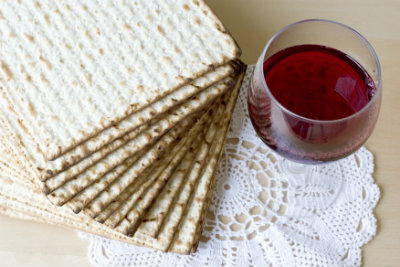
Ethics and History in Four Little Questions
This year, Passover, which celebrates the liberation of the Jewish people from the cruel reign of Pharaoh, begins on the evening of Friday, April 22nd. Over the first two nights of the holiday, families and friends will gather together to experience a Seder, a re-telling of their story followed by a festive meal. During the Seder, Four Questions are asked, typically by the youngest in attendance. The questions, and their answers, fulfill our obligation to tell the story to our children, and also piques everyone’s interest. Here, the Jewish Home’s Skirball Director of Spiritual Life, Rabbi Karen Bender, delves deeper into the Four Questions.
I want to discuss the famous Four Questions with you. Perhaps you learned these questions in religious school. Perhaps you taught these questions to your own toddlers at bath time. Maybe you never quite learned them yourself but you hoped your grandchildren would. Ma nishtanah halila hazeh? “How is this night different from all other nights?”
First of all, this night of Passover is different because of the notion of questions. The entire Seder is designed to stimulate curiosity and questioning. After all, the ability to question is a foundational Jewish value. To question is to reject the status quo and to use one’s imagination to envision a life and world that is more fair, just and loving. To question is to reject what is and to visualize what can be.
Slaves cannot ask questions. So inasmuch as the Seder is a reenactment of the Exodus from Egypt, we celebrate our freedom by asking. We ask because we can. The act of asking is so significant that the rabbis decreed even if you happen to find yourself alone on Passover, you, an adult, are supposed to ask the four questions out loud.
Let’s look at their content. Abravanel taught that the first two questions remind us of slavery and the last two acknowledge our freedom:
Question 1. On all other nights we eat bread or matzah but on this night we eat only matzah. We eat matzah at the Seder to remember our hurried escape from Egypt.
Question 2. On all other nights we eat all kinds of vegetables but on this night we eat bitter herbs. The bitter herbs are to remind us of the bitterness of Egypt.
Question 3. On all other nights we don’t even dip once but on this night we dip twice. Remember the two dippings? Parsley into salt water and the bitter herbs into the haroset. To understand this one, we have to realize most of our ancestors were poor at most times in most places. In order to dip at a meal you need to have stuff to dip into. At a feast there are lots of stews and sauces and courses and things to dip into them. Usually our ancestors were lucky to have a little bit of bread and perhaps one other item. But on this night we celebrate freedom and eat like emperors.
Question 4. On all other nights we eat sitting upright or reclining. On this night we recline. Slaves do not recline while they are eating. Free people who have plenty to eat can recline and be fed.
There is one more aspect to the four questions I have noticed over the years. If you change one vowel and say Ma nishtaNEH (instead of Ma nishtanAH), then the question morphs into, “What are we going to change tonight?” Change and transformation can occur. The pharaoh wouldn't change so the Israelites had to. They changed their thinking, their perception and ultimately their circumstances.
Passover eve is a night of reenactment and change. You begin the evening as a slave; you end it as a free person. The goal of the role playing is to change you inside. And the best way to change at your Seder is to ask these two questions of yourself: What is society's Egypt? What is my personal Egypt?
Have a Sweet Pesach!
Rabbi Karen BenderSkirball Director of Spiritual Life, Grancell Village Rabbi
Mar
20
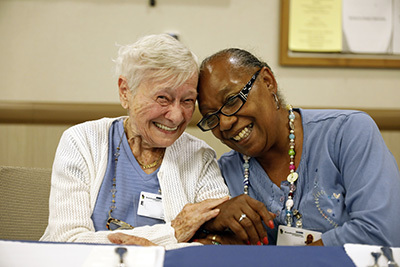
Brandman Centers for Senior Care Receives Design Award
Each year, the American Institute of Architects (AIA) recognizes projects they categorize as "Design for Aging Knowledge Community." This year, the Jewish Home's Brandman Centers for Senior Care (BCSC), a Program of All-inclusive Care for the Elderly (PACE), was honored with the Merit Award for Small Projects by the prestigious group.Opened in 2013, BCSC was built out of renovated space on the Grancell Village campus of the Jewish Home. Designed by GMPA Architects, Inc., BCSC was designed with the intention of having a unique identity, while remaining integrated with the Home's existing style. Its contemporary design reflects the fact it serves as the first PACE in the Jewish Home's comprehensive senior healthcare system.BCSC/PACE provides the community's seniors with the comprehensive care they need to continue living safely in their homes. Services include primary medical care, specialty services for vision, dental, hearing, and foot care, laboratory and diagnostic services, medical supplies and equipment, nursing and preventative healthcare, physical, occupational, and speech therapy, a state-of-the-art rehabilitation therapy room, nutritional counseling, a full service pharmacy, recreational activities, reliable transportation, and 24-hour emergency and urgent care.Because BCSC offers such a large array of medical and social services to participants, one of the biggest challenge the designers faced was to find a way to create a space that would meet the complex requirements of the program. The designers managed to take advantage of the limited space they had to work with and created a beautiful, welcoming environment where seniors can come from their homes and benefit from the various health and social services made available to them at the Brandman Center.Susie Fishenfeld, executive director of the Brandman Centers for Senior Care, said, "In the conceptualization of the Brandman Center, the designers wanted to create a space that breathes comfort and peace. We are thrilled with the idea that BCSC can be a source of admiration for the design community as well as other senior care centers."People who are 55 or older, in need of nursing home level of care, are able to safely live in the community, and are living in the BCSC service area are eligible to become participants. To schedule a first meeting with the Brandman Centers for Senior Care, call 818.774.8444, toll free at 855.774.8444 or via TTY at 818.774.3194 between 8:30 a.m. and 5:00 p.m., Monday through Friday.
Mar
19
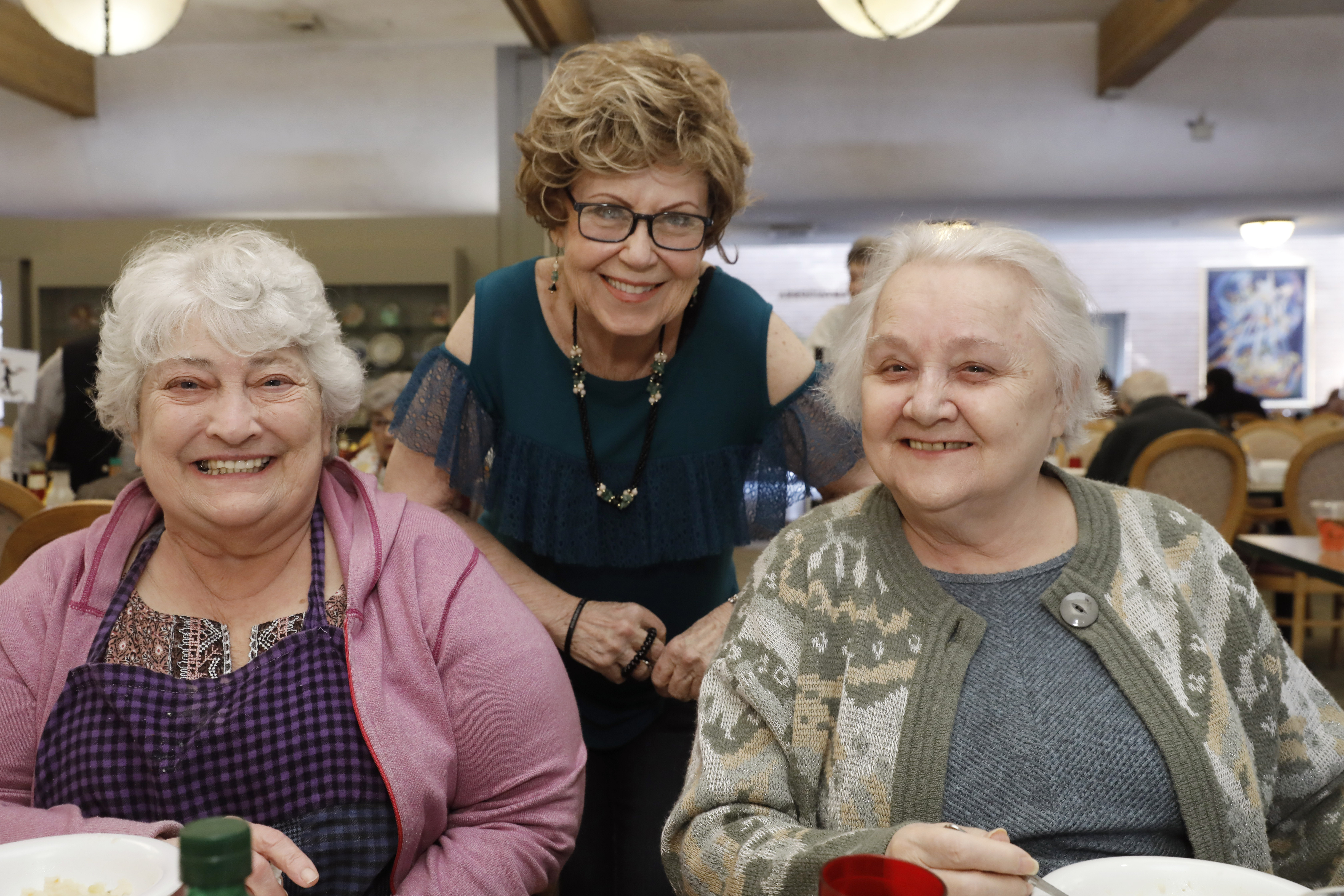
The Home’s Seniors Thank Our Firefighters
In order to thank the local firefighters for all of the incredible work they do, the seniors of the Jewish Home invited the brave men from Tarzana Fire Station 93 to the Home for a delicious lunch.On Wednesday, March 18th, Eisenberg Village residents could be found lining up along the campus' many walkways. Droves of seniors came out to welcome the parade of esteemed men in uniform.As soon as the visitors took their seats at the table of honor, staff served the gentlemen ice cold bottles of non-alcoholic beer, bowls of delectable chili, buttery slices of cornbread, and scrumptious red velvet cupcakes.While the gentlemen enjoyed the delicious meal, residents and staff members took turns with the microphone, recited poems of gratitude and shared memories of times when firefighters made an impact on their lives in the past. In closing, the firefighters thanked the seniors for a wonderful time, said their goodbyes, and returned to another day of demanding work.Susan Leitch, community manager at the Goldenberg∙Ziman Special Care Center and Factor Nursing Building was integral in facilitating this lovely luncheon. “It was a humbling experience for both the Home’s seniors and the firefighters,” says Susan. “I’m glad we were all able to come together to host today’s lunch and recognize this incredible team for everything they do.”On behalf of the Jewish Home, thank you to all the brave men and women who dedicate their lives to serving our community each and every day.
Mar
16
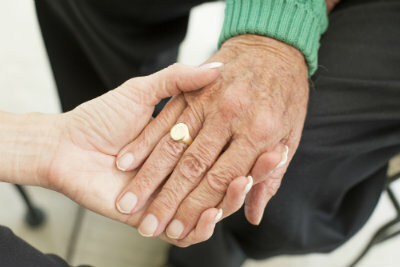
National Social Work Month
In 1965, the National Association of Social Workers (NASW) chose March as the month to annually recognize the profession of social work. This year marks the 60th anniversary of NASW and focuses on how social work paves the way for change.“I’d like to recognize all of our Jewish Home social workers who dedicate their lives to supporting others,” said Devorah Small-Teyer, MSW, director of social services in the Home’s Joyce Eisenberg-Keefer Medical Center (JEKMC). “They provide assistance to residents and families with the intention of improving their quality of life. Our social workers assess issues related to a patient’s emotional, psychological, or physical needs and help other healthcare professionals understand these needs. Social workers make a positive difference in many lives every day.”On behalf of the Los Angeles Jewish Home, thank you to social workers everywhere for your commitment to the welfare of others.
Mar
12
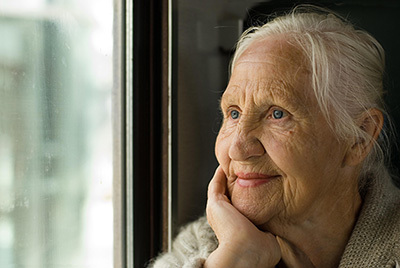
Building Bridges to Ease Loneliness
People are lonely because they build walls, not bridges.~ Unknown
Loneliness….It’s something most people have experienced at some point in their lives. For some, the feeling occurs after losing someone important to them, such as a spouse or partner, family member, or close friend. For others, it’s the loss of a job or moving away from friends and an established lifestyle that triggers it. Even the loss of a beloved pet can leave one feeling lonely.Did you know you can be lonely without being alone? You can be in the middle of a crowd and yet still experience loneliness. If you have less social interaction and sense of connection than you would like, chances are you will feel lonely.In a recent gathering, Caryl Geiger, RCFE activities director for Eisenberg Village, lead a discussion of this topic with Jewish Home residents. Many of the participants have experienced loss and major changes during their lifetime and are familiar with this sad feeling of being apart from others. Even a move to a warm, welcoming place like the Home can result in feelings of loneliness. To help deal with this side effect of transition, the Home assigns buddies to show newcomers around, make them aware of all the opportunities for socialization the Home offers, and introduce them to others.The positive effects of banishing loneliness are many. Physically, it can lead to a decrease in blood pressure and cholesterol. Cortisol levels can be lowered, which helps lessen anxiety, digestive problems, heart disease, problems with sleep and obesity. Your immune system can get a boost, leading to less susceptibility to colds and “bugs.” And less loneliness can lessen the incidence depression and, ultimately, risk of suicide.So what can you do if you’re feeling lonely? Our residents came up with a few great suggestions for relief:Read a book. Books are great company and can take you to an entirely different world.Listen to music. Music has the power to mesmerize you. It entertains, relaxes and rejuvenates.Dance. Dancing can let your frustrations out and help you forget your loneliness.Take a walk. Walking makes you part of the world around you while relaxing your body and mind.Exercise. While you’re becoming stronger and feeling healthier, you might make a new friend in yoga class or try out the latest group fitness class.Paint. Express yourself without worrying about the outcome.Garden. Let your garden delight your senses and chase away your loneliness.Meditate. Meditation will help you be at ease, whether you are alone or with others.Clean. While not as much fun as the other ideas, it’s an opportunity to focus on the task at hand and put your house in order.Sleep. A nice nap can help you feel refreshed and renewed.These suggestions can be very helpful in providing short-term relief. Some of them can actually motivate you to reconnect to the world – you may find you’d like to join a book club, or perhaps on your walk you make a new friend, or you are inspired to take an art class. In other words, you begin building a bridge to help end your loneliness.For many people, trying a new activity or talking to someone they don’t know is out of their comfort zone. This can be true for anyone at any age. By taking the focus off of yourself and putting it on others, you can take the first step to making a connection. Smile, say hello, and ask how someone is. People are often eager to talk about their lives. As simple as that, you may be on your way to making a new friend.If you are experiencing chronic loneliness, please reach out to someone you trust – a family member, friend, rabbi or other spiritual leader, or professional counselor. Therapy is often helpful for discovering the reasons for your loneliness, developing coping skills, and moving forward to a happier, healthier life.
Mar
6
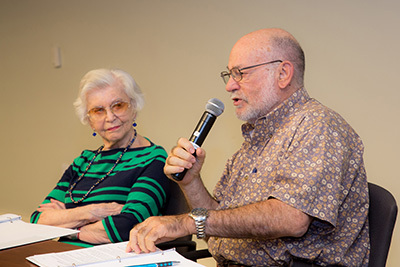
Eisenberg Residents Learn Hebrew
Each Friday morning, a group of eager residents gathers in the Eisenberg Village (EV) synagogue, ready to learn Hebrew. As the senior students enter the classroom they excitedly practice what they've learned in the past. One resident greets her peers with a peppy "Shabbat Shalom!" — a greeting used to wish someone a peaceful Shabbat — and another resident replies, "Ech Holech?" which means "How is it going?" in Hebrew.After the seniors have settled in, 73-year-old EV resident and volunteer Hebrew teacher Michal Robins calls the class' attention to the board where she has written the words "Shabbat Shalom — Hayom yom shishi." She asks her students, "Do any of you know what this means?" One brave resident raises her hand and says proudly, "Today is Friday." "Excellent!" Michal exclaims. Michal went on to break down the meaning of each word in the sentence, "Hayom means today. Yom means day. Shishi means the sixth day, which is Friday. Put it together and what have you got?" The class answered with enthusiasm, "Today is Friday!"As the lesson continues, Michal passes out the week's handwritten handouts, sheets of Hebrew words listed next to their meanings. Then Michal explains the meaning of each Hebrew word and helps students create and practice simple, conversational phrases. The seniors excitedly practice their newly learned Hebrew phrases while Michal watches and kindly corrects the students' pronunciation as they practice their phrases.The Friday morning Hebrew class is one of many engaging activities and programs available to the residents of the Los Angeles Jewish Home. Each activity offered is designed to stimulate the mind, body, and spirit of the seniors. Michal's Hebrew class is an excellent way to facilitate new skills, new interests, and new friendships — all while encouraging learning throughout all of life's stages.Social worker Thelma Mata considers learning a new language to be one of the best ways to mentally exercise. She explains, "Getting to know a new language is an excellent way for seniors to increase their brainpower. It enhances their ability to juggle tasks and stay sharp. It's also an exercise in memory and engagement."Myrtle Feenberg, a 99-year-old EV resident, agrees. "I've learned quite a few words and phrases in Hebrew from Michal. I think the class is wonderful! I love coming each week because it stimulates my brain and gives me the chance to learn something new."The proud teacher is pleased with the progress Myrtle and her other students are making. "Like all languages, it takes people a while to absorb all the new information," says Michal. "It takes time, practice, and repetition — that's why we review at the beginning of each class. Hebrew is a complicated language, but with our weekly exercises the participants are becoming real experts."